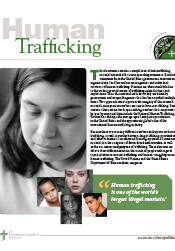Human Trafficking

What is human trafficking?
Human trafficking, which recently became the world’s third-largest criminal enterprise, is a form of modern-day slavery. The United Nations estimates that over 20 million people are missing due to human trafficking.
The U.S. Department of Justice estimates that between 14,000 and 17,000 people are trafficked every year into the United States.
Human traffickers use force, fraud or coercion to lure vulnerable people into slavery. Despite myths in popular culture, traffickers are often people who know the victim: a family member, close friend or significant other.
By exploiting vulnerability, human trafficking has created an estimated $32 billion global profit that continues to grow larger every day.
Download information sheet
Types of human trafficking
While exploitation can take many forms, human trafficking is usually found in industries that demand cheap human labor. This can include agricultural industries such as farming; hospitality services such as hotels, restaurants, and beauty parlors; or the commercial sex industry.
Demand for cheap labor has driven human trafficking to a horrific size. Traffickers often manipulate immigrants by stealing their legal documents, trapping them in a cycle of forced labor.
- Continue reading
-
They seek out at-risk children in foster care or isolated home environments, the economically vulnerable, refugees or immigrants, the homeless and others susceptible to poverty and manipulation.
They fraudulently promise well-paying jobs, or simply love and a fresh start, before exploiting their victims for commercial gain.
The effects of human trafficking
Most people who fall into trafficking fear law enforcement because their traffickers threaten them with deportation or imprisonment. This makes human trafficking an invisible crime that is vastly under-reported.
People who escape human trafficking often suffer from malnourishment, drug addiction, physical abuse and psychological trauma.
Children who are trafficked are at risk for higher rates of depression, poverty and suicide.
Because of its invisible nature, shelters dedicated to victims of human trafficking are sparse and usually don’t have the resources necessary for the guaranteed safety and recovery of survivors.
Identify, Understand and Intervene
Education is the most widely accessible way to put an end to human trafficking. Everyone needs to be equipped with ways to identify, understand, and intervene in instances of human trafficking.
- Continue reading
-
- Identify: Use the resources below to identify your “slavery footprint.” Our spending habits often contribute to the global market of human trafficking through forced labor.
Identify the signs of human trafficking by opening your eyes to vulnerable populations in your community. If you see a child who appears homeless or wandering without an adult, contact law enforcement or a safety officer.
- Understand: Every individual that falls into human trafficking is made in the image of God. Understand that there is no demographic that is more “likely” to become a victim of trafficking.
Human traffickers are able to exploit weakness and longing for love and appreciation just as easily as they exploit financial struggles. Read and pray for the empowerment of victims of human trafficking, and let their input lead awareness campaigns to end slavery.
- Intervene: Put the Human Trafficking Hotline phone number — 888-373-7888 — into your cell phone. Send a text message if you notice suspicious activity.
If you see unsupervised children hanging around certain areas of your local shopping center or other community gathering place consistently every day when they ought to be in school, report it to a safety officer.
If you see someone in your congregation who seems isolated from the rest of their his peers, form a connection with them. Never try to confront someone you believe is a trafficker or a human trafficking victim on your own, as that can endanger both your safety and the safety of the victim.
Always cooperate with law enforcement.
Download information
Resources
Emergency hotline & government resources
Assistance for human trafficking victims